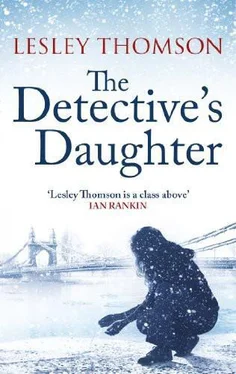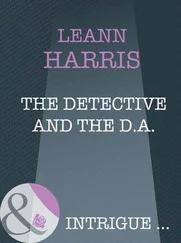The gum did not stop his teeth chattering; he had rarely experienced fear like this. He had relied on the shots of adrenalin that pumped around his body while he counted down to raid a drug dealer’s house, or faced a posse of journalists ready to annihilate him. The reality of coming here without a warrant, without proof, without even being a police officer hit him.
Headlines. Photographers. Disgrace. Failure to solve the Rokesmith case would be nothing compared to being caught breaking and entering.
Bang. Bang. You’re dead .
He pictured the little boy aiming two fingers at him with dark, accusing eyes.
He was doing this for the boy and for his father.
Hugh Rokesmith had been a man of few words; his short marriage had blighted his entire life. Terry had been wrong and wished that he could tell him. He felt for the thin, slightly stooped figure whose drawling manner had done him no favours. When Rokesmith died Terry had been angry that he had evaded prison, but now Terry was sorry he could never make amends. At least he could present Jonathan Rokesmith with his mother’s killer and exonerate his father. The prize was within his reach.
The door jolted on its hinges with a thump and Terry was bathed in orange light.
Brown eyes and shoulder-length hair. Eau Savage Extreme: she preferred aftershave to perfume. She didn’t care what people thought.
From such clues as these had the detectives built up a profile of the dead woman, as if knowing her better would tell them how she had come to be murdered.
A pair of trousers and a blouse like those she had been wearing when her body was found were hanging from the wardrobe. It was like meeting long-lost friends. Isabel Ramsay could not describe Kate’s clothes to the police because she had not seen her. A splash of green from the scarf to match the lemon patterned blouse; Terry did not know about clothes, but knew what he liked. His ex-wife had worn the same blouse until discovering it was the taste of a murder victim.
Under a chair, toes pointing out, the scent of perfume acceding to mothballs and damp, were her shoes.
A trickle of sweat ran into his eyes; he blinked and with a punch his chest constricted. Terry had no words to express the sight, yet words were everywhere; newspaper articles, the type small, large, black, white, were fitted around picture after picture: Kate Rokesmith’s image was plastered over the walls.
A book lay on a wooden nightstand: Wuthering Heights . He made out an inert lump in the bed.
The second place at breakfast.
Wheels crunched on the drive. Crashing into the door jamb, he plunged along the passage, just remembering to switch off his torch. He stopped at one of the windows: Challoner was getting out of his car, younger, fitter and more agile than Terry, whose muscles were draining strength as if a plug had been pulled.
Terry was trapped. No one knew he was here; he had not told Stella.
He fumbled blindly with a cupboard door, grabbed the handle and found himself at the head of a staircase like the one at the other end of the passage. Symmetry . He felt a surge of love for the architect.
At the bottom, the silence told him he had not woken the person in the bed. If there had been a person at all; nothing in this bloody place was what it seemed.
Terry identified domestic sounds: the fridge door opening and closing, drawers slamming, a tap splashing which set pipes clanking. The roar of a boiling kettle, a rising whistle that subsided, water pouring into a mug, two mugs; comforting noises that offered him no comfort. With the scrape of a chair a shadow fell across the passage: Challoner was coming. Terry had no time to go back upstairs.
There was a door.
He tumbled down a step, twisting his ankle. He bit on his hand as hot pain seared up his calf, retaining enough presence of mind to pull the door shut after him.
Challoner must know he had an intruder; the sound of his heels clicking on the stone passage was close. He could have seen Terry’s car, or maybe knew his back door was unlocked. Terry scrambled behind a shelf unit that would not shield him if Challoner put on the light. He curled into a ball and on a childish impulse hid his head in his hands to increase his invisibility.
A strip of light missed his hiding place by inches. He heard a chink of glass and peeped through his fingers. Challoner was lifting a bottle of whisky out from a wooden case stuffed with straw. He left and closed the door, but Terry did not move; he might be calling the police. Then he considered what he had seen: a shrine to a murdered woman. Calling the police was one action Challoner would not take. He got up and rolled his shoulders to encourage circulation.
Between him and the external doors was a shape shrouded in stiff tarpaulin. Wedged in tight, between it and the wall, Terry tugged ineffectively at one of the cords holding the tarpaulin; it was tightly knotted. He tried to undo it, but it would not budge. He laid the torch on the concrete floor and pulled his keys out of his trouser pocket. He sawed the cord between the teeth of the mortice key; old and frayed, it gave way and he snatched and tugged at the canvas until he had created enough slack to lift it free.
In the feeble light of the failing torch he knew what he was looking at. He pulled at the canvas until he could poke his torch beneath.
There were newspapers on the floor. He tore off a scrap and scribbled the number down.
He heard footsteps above.
The person might see the quilt on the bedroom floor and realize they had an intruder.
The garage doors were locked with two rusted bolts, top and bottom; after one desperate tug, the top one released with a bang like a gunshot. Terry went to work on the lower bolt and grazed his hand before he eventually wrenched it out of the floor. The door shuddered loudly when he opened it enough to squeeze through. He closed it behind him. In the throes of another flush, the cold air was welcome; he mopped his face with his handkerchief. He had pulled his shoulder at some point and it ached. His strained ankle hurt and his breathing was like sucking on a blowtorch. He was out of condition; when this was over – how extraordinary that he could think of the Rokesmith case as over – he would follow doctor’s orders and get fit.
This time Terry risked jumping down from the gate into the churchyard. He executed a perfect landing on the tiled path and wished Stella had been there to see it.
Terry was woken by a pain in his cheek where the armrest had been digging into him. The papers had dropped from his hand and were scattered in the well beneath the front passenger seat. He gathered them up and, trying to stretch, hit his shin on the window. Terry was in the habit of taking documents from the case files when he left the house, hoping to spot something new. He smoothed out on his lap the psychiatrist’s reports on the boy in the weeks after the murder. He had attended all the meetings, desperate that Jonathan would speak and describe his mother’s killer.
He climbed out of the car, his damp shirt sticking to his skin. Seven forty-five and it was barely light. He had slept over eight hours, yet he did not feel better for it.
His bladder was full. He looked up and down the road; his was the only car parked in the seaside bays. Opposite was a recreation ground and in the distance there were already lorries on the A259. Out of sight, below a bank of pebbles, came the wash and hush of the tide. He clambered over a wall separating the beach from the road, crossed a concreted walkway and took jumping strides, his feet sinking into the shingle, down to the shoreline. Dark-grey sky merged with iron-grey sea. He laid the papers down, weighing them with a chunk of bleached wood, and peed. He swayed as he did up his zip. His head was a mush as if he had been drinking. Last night had been the first night for weeks when he had not had a drink and nor had he eaten.
Читать дальше












